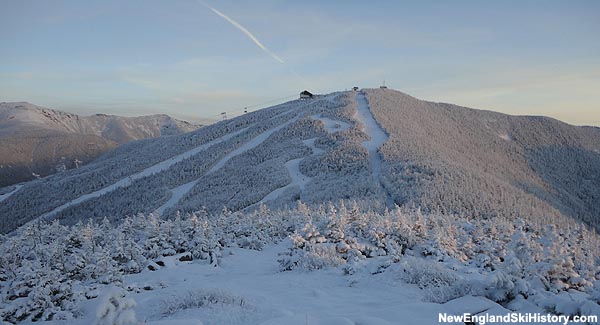
|
|
Towering over Franconia Notch, 4,100 foot Cannon Mountain is home to one of the oldest ski areas in New England.
Franconia Notch Forest Reservation and Memorial Park
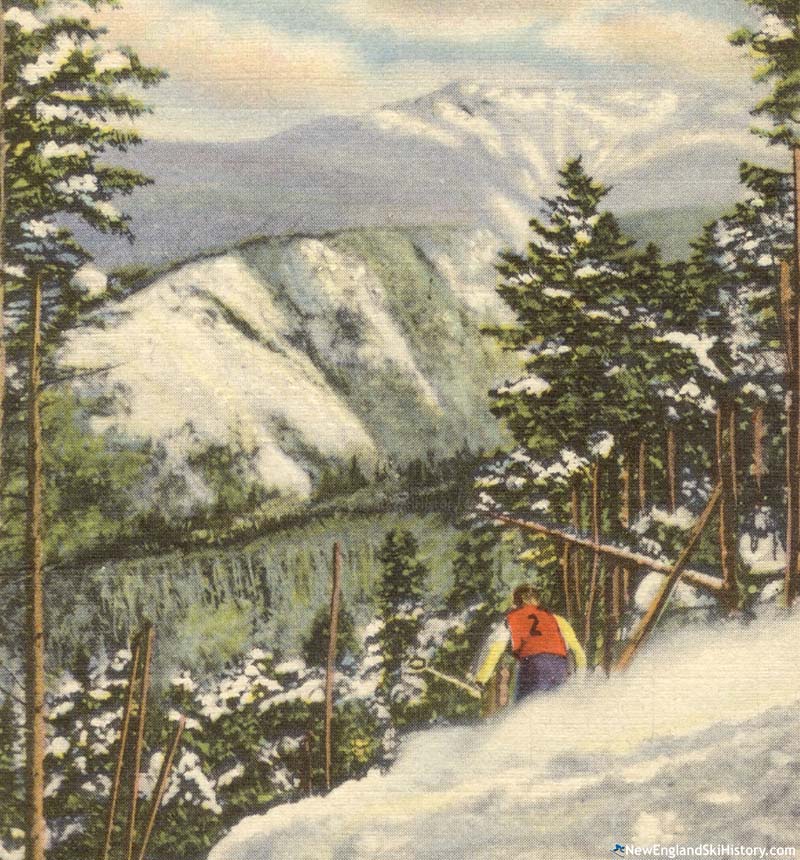
A rendering of the Taft Trail from the 1930s |
Franconia Notch State Park dates back to 1928, when the State of New Hampshire established the Franconia Notch Forest Reservation and Memorial Park as a memorial to veterans to be conserved and administered by residents and their visitors. Meanwhile, the Peckett family was developing their Sugar Hill inn into a winter destination resort, complete with a ski school and slope.
In the early 1930s, the Pecketts saw potential in nearby Cannon Mountain and began spurring potential ski trail development. Duke Dimitri von Leuchtenberg designed a trail, which was partially cut by a local crew starting in the summer of 1932. The result was the Richard Taft Trail, which partially debuted in February of 1933. A Civilian Conservation Corps crew later helped refine the trail.
The First Aerial Tramway in North America
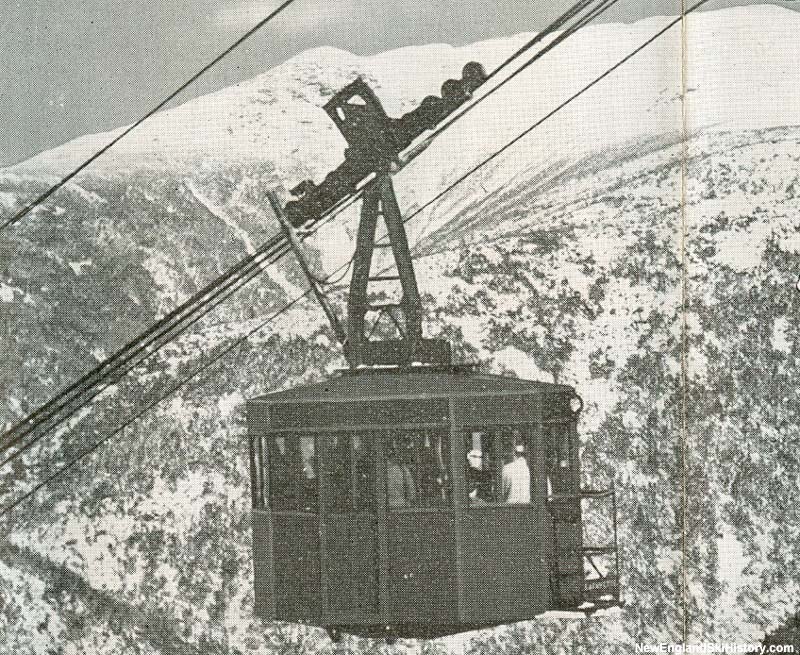
The original tram |
In early 1935, legislation surfaced to start construction of an aerial tramway on Cannon Mountain with appeals to the Federal government for funding.
In June of 1937, Governor Francis Murphy signed a bill for a $250,000 tramway project. That August, a $246,975 contract was awarded to American Steel & Wire Company. Work began soon thereafter, with the Civilian Conservation Corps assisting with related facility developments.
While the new lift was to debut in May of 1938, weather related delays pushed the official opening back to June 28th (members of the press were given rides on June 20th).
Along with the opening of the Cranmore Skimobile and the first full winter of the Belknap single chairlift, the tramway's 1938-39 debut transformed the New Hampshire ski scene. While the uphill capacity was rather slim at 170 passengers per hour, it provided the highest elevation uphill transport in New England. With the existing CCC ski trails terminating far away from the lift, new trails were designed to better tie into the development, including the Cannon Mountain Trail in 1938 and the Ravine Trail in 1939.
On September 28, 1939, the tramway had its first well-covered malfunction when the counterweight rope slipped. 34 passengers had to be evacuated by rope from heights of up to 60 feet. General Manager Roland Peabody claimed in the Boston Globe that the incident gave passengers an 'added thrill.' The tram remained closed until late October.
The 1940s
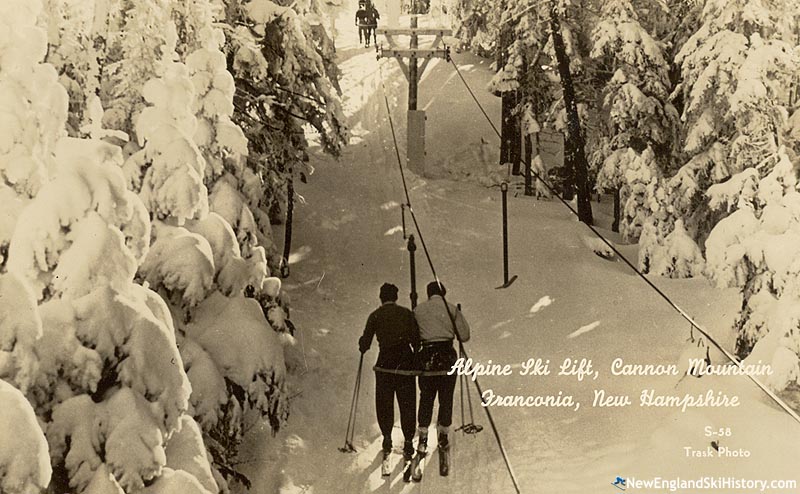
The upper mountain Alpine Lift circa the 1940s or 1950s |
With Cannon Mountain ski area quickly gaining popularity and the tramway providing minimal uphill capacity, the state decided to purchase a new Alpine Lift T-Bar for the 1940-41 season. The new lift was constructed at the top of the mountain to help take advantage of the higher snowfall amounts. Unfortunately, construction delays resulted in the lift not opening until March of 1941.
Upper and Lower Hardscrabble were opened for the 1941-42 season, further tying in the T-Bar and aerial tramway. Meanwhile, in February of 1942 Baron Hubert von Pantz opened a small rope tow at his Mittersill development near the bottom of the Richard Taft Trail.
With World War II transforming the country, Cannon scaled back operations for the 1942-43 season, often running only the tramway when adequate snow allowed.
The rope tow served Practice Slope debuted for the 1944-45 season, providing beginners a place to ski without having to worry about ascending and descending the large mountain above it. The slope was dramatically expanded for the 1946-47 season. Meanwhile, nearby Mittersill became a major ski area when a T-bar was installed serving its lower slopes.
Existing trails were widened and reworked for the 1947-48 and 1948-49 seasons. In addition, a 25 meter jump was added for the latter season. By this point, Cannon Mountain was taking in a quarter of a million dollars of revenue per year, with the vast majority of that coming from scenic tramway rides. Meanwhile, the state government opened its second major area, named Mount Sunapee.
Tramway and Easy Way were cut for the 1949-50 season, while the summit T-Bar was rebuilt. In the spring of 1950, the New Hampshire Legislature approved the abolition of the New Hampshire Aerial Tramway Commission, transferring any remaining funds to the forestry and recreation commission in June of 1951.
Meanwhile, Paulie's Folly was cut for the 1950-51 season.
A New Base Area
After three poor seasons in which the tramway and T-Bar seldom operated, Cannon's management requested a quarter of a million dollars for major improvements in 1951. The recently state-of-the-art tramway was declared to be 'entirely inadequate to handle the crowd wishing to ski the mountain.' Upon hearing of the proposal, the owners of Black Mountain, Cranmore, and Thorn Mountain threatened to close their ski areas if the government spent more state money in direct competition with their businesses.
While the 1951 proposal was rejected by the legislature, Cannon eventually received the requested funds and more when the state poured $305,000 into the ski area for the 1953-54 season.
The 1953-54 expansion included a 281% increase in uphill capacity, 35% more skiable acres, and twice as much parking. The Peabody base area was constructed, consisting of a parking area, base lodge, and 3,200 foot T-Bar. From the top of the lower T-Bar, the 1,400 foot middle T-Bar carried skiers up to the original upper T-Bar. Five new trails were cut up to 300 feet in width.
An additional $22,000 was spent to improve the Peabody base for the 1955-56 season, including an enclosure for the T-Bar and a new wing for the base lodge. A privately run Carroll Reed rental and retail shop was opened in the new wing. In addition, a 40 meter jump was constructed near the tram. Following the season, $90,000 was spent to replace the tram cable.
In 1957, while Cannon was looking for more state funds for trail and lift projects, next door neighbor Mittersill decided to try to do something about the chronically bad winters of the era by installing snowmaking. Cannon would delay the installation of its own snowmaking system for over a decade, choosing instead to purchase new lifts.
For the 1958-59 season, the state constructed new wings on the tram base station and the Peabody base lodge. In addition, the 17 year old upper T-Bar was replaced with a new 'high speed' T-Bar.
Cannon's First Chairlifts Installed
During the 1961-62 season, the state moved ahead with legislation for another modernization project at Cannon and Sunapee. Piggybacking the relocation of Route 18 to the other side of Echo Lake, the State of New Hampshire spent $651,286 to install a double chairlift in the Peabody area, a T-Bar on the Banshee slope, and to develop the Zoomer Area with a double chairlift. While the Middle T-Bar was removed from the trail map for a short period, it was apparently mothballed and brought back into service. The new lift network increased the uphill capacity from 2,600 to 5,300 skiers per hour.
On March 12, 1963, a powerful gust of wind caused the deropement of tram car Lincoln, resulting in it slamming to the ground and injuring a passenger. The tram remained closed for the rest of the ski season as the accident was investigated and damaged car removed.
Meanwhile, Baron Hubert von Pantz sought permission to expand his Mittersill on leased land using private funds. After being denied by the state, Baron Hubert von Pantz declared, "if the state doesn't want to cooperate with private enterprise, then why not buy it out. I'm prepared to sell." The state finally allowed him to install a double chairlift in 1966-67.
The state purchased a second summit T-Bar (the third summit T-Bar if including the 1941 install), for the 1965-66 season. Following many deficits, the New Hampshire legislature required the State Parks system to become 'self funded' that year.
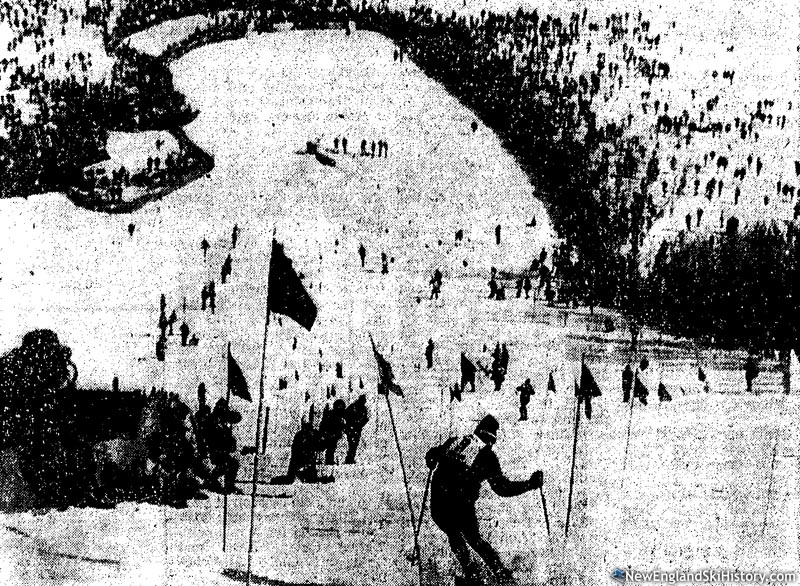
Jean Claude Killy in the 1967 World Cup races |
In conjunction with the massive press of hosting the Jean Claude Killy dominated World Cup races in March of 1967, Cannon's management requested another $1.8 million in state funds to 'modernize' the ski area. The proposal included a new Northern Base Area, a new lodge, 15 acres of additional parking adjacent to Echo Lake, three new lifts, a summit station addition, new trails, and snowmaking for the Zoomer Area.
Snowmaking Arrives
Snowmaking as finally installed at Cannon for the 1968-69 season when the state paid $544,000 to install a system covering 7 trails in the Zoomer and Peabody areas. A pumphouse was built on the side of Echo Lake. Fortunately for Cannon the 1968-69 season featured record snowfall, as the new system was not ready to go until mid January. An end-of-February snow storm was the icing on the cake for the banner season, as some 47 inches fell in about 24 hours, resulting in a massive effort to dig out the lifts, buildings, and parking lots from huge drifts.
The state spent nearly $1 million at Cannon for the 1972-73 season when it built a new base lodge in the Peabody area, renovated the summit lodge, and replaced the lower T-Bar with a new double chairlift (which would later become known as the Hong Kong). Also that season, a new policy was started in which those age 70 or older could ski for free at Cannon or Sunapee.
As was the case throughout New England, the 1973-74 season was a disaster at Cannon. By the end of March 1974, Cannon recorded less than $150,000 in revenue, a fraction of its average runrate. As a result, the state poured additional money into the snowmaking system. A new novice Poma lift debuted for 1975.
Replacing the Tram
Around this time, Cannon's management ramped up requests for a new tramway, claiming the 36 year old lift was inadequate and causing financial harm to the ski area. Also around this time, Governor Meldrim Thomson proposed building a wind turbine at the top of Cannon Mountain to offset the tram energy usage.
Citing competition with private industry, as well as the then-$3 million request for a tram replacement, Governor Thomson considered selling or leasing both Cannon and Sunapee in 1977. The tram replacement was eventually approved, however, for $3.7 million. In May of 1978, Agudio Corp. of Italy came in with the lowest bid at $3.8 million. Work began in July of 1978 and continued through May of 1980. Growing to $4.6 million in cost, 80 passenger tramway debuted in late May.
After decades of local opposition, construction finally began on the Franconia Notch Parkway in 1982. Upon opening in late 1987, this new Interstate 93 connector dramatically improved access to Cannon Mountain. The road was formally dedicated in the spring of 1988.
The State of New Hampshire spent $500,000 in 1984-85 to install a new triple chairlift serving the Zoomer Area.
Mittersill Closes
Around this time, nearby Mittersill ski area closed. Efforts to incorporate Mittersill into Cannon ramped up as the 1980s progressed. After acquiring some privately held land near the bottom of the area, the state pushed to either get a National Forest use permit or landswap for the rest of the Mittersill ski area land. Meanwhile, the Mittersill trail network was becoming a legendary sidecountry/backcountry destination.
In March of 1987, the State of New Hampshire Executive Council authorized a $34,000 contract with Garaventa for work on the Cannon Aerial Tramway. Also in June of 1987, the State of New Hampshire Executive Council authorized $140,000 to remove asbestos, replace a boiler, repave the parking lots. In August, the State of New Hampshire Executive Council authorized a $100,000 in repairs at Cannon and Sunapee, as well as repairs to two non-ski area state buildings. In September, the State of New Hampshire Executive Council encumbered $79,500 to repair spring flood damage on Polly's Folly and Gary's ski trails.
For the 1989-1990 season, the state spent $1.2 million on snowmaking improvements at Cannon.
For the 1990-1991 season, the state spent $2.5 million on improvements at Cannon, including installing the Cannonball quad chairlift and expanding snowmaking capacity. An unfortunate consequence of this project was the clearing of the wide Cannonball/Profile slope, which has plagued the upper mountain with wind problems to this day.
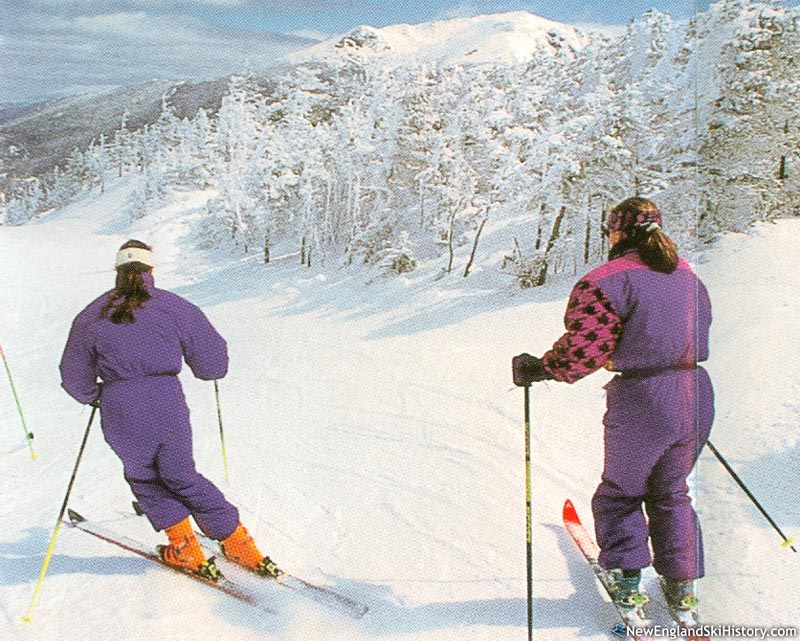
Cannon in the late 1980s/early 1990s |
Mount Sunapee Leased
In September of 1996, the State of New Hampshire Executive Council authorized a $14,850 agreement with Sno-Engineering for development of a potential lease for Cannon and Mt. Sunapee. A year and a half later, numerous firms made bids on a lease of Cannon Mountain and Mount Sunapee. Bidders included ski companies connected to Bretton Woods, NH, Cranmore/Loon/Waterville Valley, NH, Jay Peak, VT, Okemo, VT, and Wachusett, MA. In a political compromise, only Sunapee was leased. On July 1, 1998, Mount Sunapee ski area was leased to the owners of Okemo, with resulting revenue to be spent on a bond funding fifteen years of Cannon Mountain improvements.
In April of 1998, the State of New Hampshire Executive Council authorized a $96,800 agreement with Vonroll Tramways for work on the Cannon Aerial Tramway. In August the State of New Hampshire Executive Council authorized a $14,850 agreement with Sno-Engineering for development of a Cannon and Mittersill Master Plan.
For the 1999-2000 season, three lifts were added to Cannon. Two triple chairs were installed using parts from the former summit lift at Sunapee, providing service for novices out of the Peabody base. In addition, the aging Peabody double chairlift was replaced with a $2,159,285 Garaventa CTEC high speed quad, providing tandem four-passenger-chairlift service to the summit from the Peabody base.
In November of 2001, the State of New Hampshire Executive Council authorized a $1,009,000 agreement with American Tramways Inc. for Cannon Aerial Tramway upgrades and repairs.
In September of 2002, the State of New Hampshire Executive Council authorized a $303,000 contract with Paragon Construction, Inc. for a new septic system for Cannon's Peabody area.
In July of 2003, the State of New Hampshire Executive Council authorized the installation of the $540,000 Tuckerbrook chairlift. The lift served the new novice Tuckerbrook Area. Unfortunately, the new lifts were not enough to propel Cannon into the success some had hoped it would achieve. The ski area posted operational losses from 2002 through 2007 and overall losses including debt payments from 2002 through 2012.
A crushing audit of Cannon in 2008 revealed many issues, such as open safes, unattended cash drawers, unsecured credit card information, minimal ticket accounting, season pass revenue exposures, and a lack of inventory control.
Mittersill Acquired
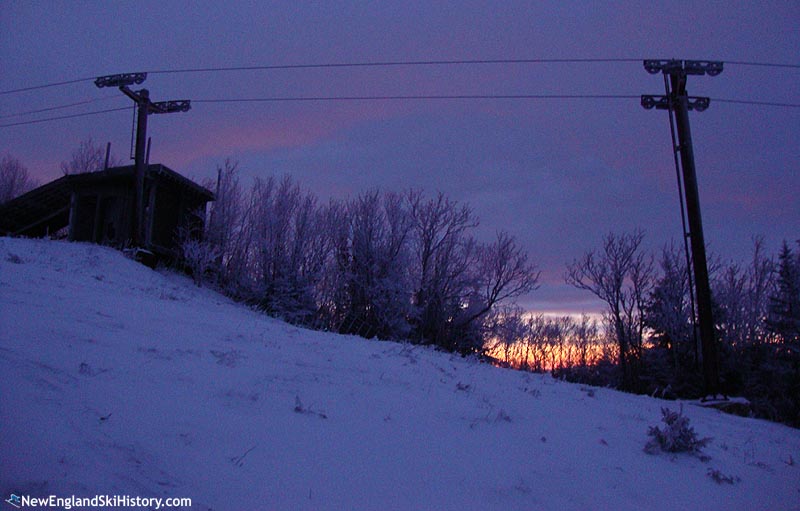
The sun sets on the old Mittersill double chairlift (2009) |
After years of negotiating, Mittersill was incorporated into Cannon Mountain ski area in 2009 via a landswap with the National Forest, on the condition that the original trail footprint would be honored. On the eve of the landswap, Cannon Mountain General Manager John DeVivo was quoted in The Boston Globe as saying, "I can't overstress the fact that it's going to remain rough," and that "once we do clear-cutting or full-blown grooming, you can't go back."
The backcountry emphasis of Mittersill was then gradually phased out. With a large infusion from the state general fund, a new $3 million double chairlift replaced the old Mittersill chairlift, opening on January 1, 2011. With this opening, all uphill traffic was formally banned year round, including backcountry skinning for 'earned turns.' Trail grooming at Mittersill then debuted on February 11, 2011.
On June 1, 2011, the New Hampshire State Senate amended HB1 and HB2, potentially resulting in the private lease of Cannon Mountain ski area. Later that month, it was announced the lease was removed from HB1 and HB2 and would instead be debated as a separate bill in January 2012. The subsequent bill, SB 217, called for multiple Cannon-related provisions, including exploring lease possibilities. While SB 217 passed the State Senate, the retooled version that emerged from the House was tabled.
The 2011-2012 season was particularly rough at Cannon, as the antiquated snowmaking system struggled to open significant terrain for the holiday season. Mittersill remained formally closed for all but 5.5 days of the season. Combining operational losses and debt subsidies, Cannon found itself nearly $1 million in the red for fiscal year 2012.
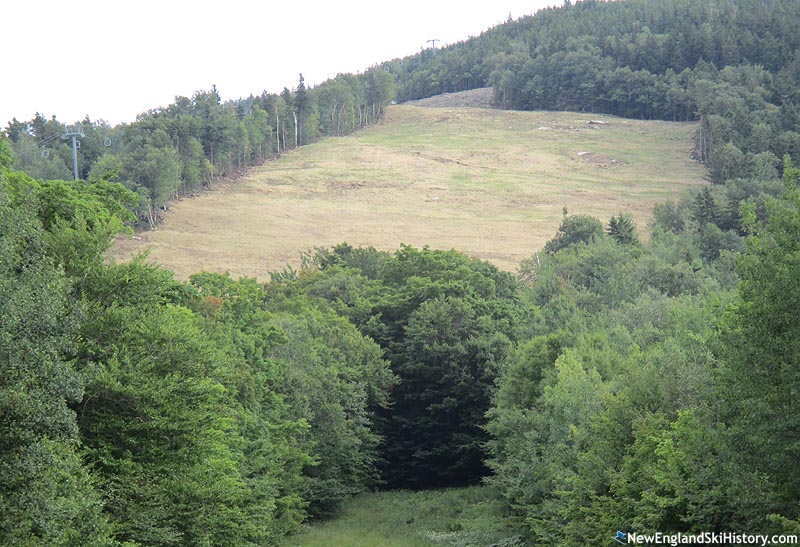
Construction of the Taft Superslope (2015) |
That off-season, the Mittersill Racing Expansion Proposal was quietly released. Using private funds, the project would convert Mittersill into a semi-private racing facility.
In 2014, Baron's Run was widened for racing purposes. In 2015, snowmaking was installed on Baron's Run, whilst the Taft slope was widened and extended uphill. In 2016, a T-Bar and snowmaking were installed on the Taft Superslope, the widest trail in the state.
NewEnglandSkiIndustry.com News
| Recent Articles |
| Cannon Announces Closure of Aerial Tramway - Jul. 14, 2025 | | Attitash and Cannon Entering Weekend with Key Lifts Out of Service - Feb. 7, 2025 | | State to Request $15 Million More for Cannon Tramway Project - Apr. 30, 2024 | | Cannon Mountain Tramway Project Hits Roadblock - Jan. 27, 2024 | | Cannon Mountain General Manager John DeVivo Departing - Jul. 11, 2023 | | Cannon Mountain Tramway Project Approved - Jun. 22, 2023 | | Cannon Mountain Tramway Bill Approved by Senate - Feb. 23, 2023 | | Multiple Lift Closures Plaguing Cannon Mountain - Jan. 27, 2023 | | Cannon Seeks Approval for $109 Lift Ticket Rate - Oct. 13, 2022 | | Cannon Seeking $10 to $30 Million for Tramway - Jul. 23, 2021 | | Cannon Mountain NewEnglandSkiIndustry.com News Page |
CCC Trails
Expansion History
Image Gallery
Lifts
Click on lift name for information and photos
Maps
Year by Year History
Adult Weekend Full Day Lift Ticket; Adult Full Price Unlimited Season Pass. Window price, including RFID fee and taxes when known.
| 2020s |
Ticket Price |
Season Pass Price |
Pass Payback |
Opening Day |
Closing Day |
Skier Visits |
| 2025-26 | $139.00 |  | $999.00 |  | 7.2 days | November 22 | | |  | | | 2024-25 | $139.00 |  | $899.00 |  | 6.5 days | November 29 | April 13 | |  | | | 2023-24 | $116.00 |  | |  | | December 2 | April 8 | |  | | | 2022-23 | $109.00 |  | $859.00 |  | 7.9 days | December 3 | April 16 | |  | | | 2021-22 | $99.00 |  | $839.00 |  | 8.5 days | December 3 | April 10 | |  | | | 2020-21 | $89.00 |  | |  | | December 12 | April 11 | |  | | | 2019-20 | $82.00 |  | $829.00 |  | 10.1 days | November 23 | March 18 | |  | |
| 2010s |
Ticket Price |
Season Pass Price |
Pass Payback |
Opening Day |
Closing Day |
Skier Visits |
| 2018-19 | $79.00 |  | $799.00 |  | 10.1 days | November 23 | April 15 | |  | | | 2017-18 | $77.00 |  | $889.00 |  | 11.5 days | November 24 | April 15 | |  | | | 2016-17 | $75.00 |  | $859.00 |  | 11.5 days | November 25 | April 16 | |  | | | 2015-16 | $75.00 |  | $859.00 |  | 11.5 days | December 4 | April 10 | |  | | | 2014-15 | $74.00 |  | $829.00 |  | 11.2 days | November 28 | April 19 | |  | | | 2013-14 | $72.00 |  | $799.00 |  | 11.1 days | November 29 | April 20 | |  | | | 2012-13 | $70.00 |  | $785.00 |  | 11.2 days | November 30 | April 14 | 109,888 |  | | | 2011-12 | $68.00 |  | $760.00 |  | 11.2 days | November 25 | March 25 | 90,384 |  | | | 2010-11 | $67.00 |  | $729.00 |  | 10.9 days | November 26 | April 17 | 130,952 |  | | | 2009-10 | $66.00 |  | $699.00 |  | 10.6 days | | April 7 | 103,387 |  | |
| 2000s |
Ticket Price |
Season Pass Price |
Pass Payback |
Opening Day |
Closing Day |
Skier Visits |
| 2008-09 | $64.00 |  | $670.00 |  | 10.5 days | | | 102,582 |  | | | 2007-08 | $60.00 |  | $630.00 |  | 10.5 days | | April 13 | 103,885 |  | | | 2006-07 | $54.00 |  | $595.00 |  | 11.0 days | December 8 | April 8 | 94,250 |  | | | 2005-06 | |  | |  | | | April 2 | 81,533 |  | | | 2004-05 | |  | $595.00 |  | | | April 10 | 105,693 |  | | | 2003-04 | $45.00 |  | $730.00 |  | 16.2 days | | April 4 | 109,562 |  | | | 2002-03 | $45.00 |  | $730.00 |  | 16.2 days | November 19 | April 6 | 121,982 |  | | | 2001-02 | $44.00 |  | $730.00 |  | 16.6 days | December 14 | April 7 | 116,132 |  | | | 2000-01 | $42.00 |  | $730.00 |  | 17.4 days | November 24 | April 15 | 133,656 |  | | | 1999-00 | $42.00 |  | |  | | December 4 | April 2 | 100,601 |  | |
| 1990s |
Ticket Price |
Season Pass Price |
Pass Payback |
Opening Day |
Closing Day |
Skier Visits |
| 1998-99 | $39.00 |  | $730.00 |  | 18.7 days | November 28 | April 4 | 105,817 |  | | | 1997-98 | $37.00 |  | $695.00 |  | 18.8 days | November 29 | April 4 | 115,009 |  | | | 1996-97 | $37.00 |  | |  | | November 30 | | 93,078 |  | | | 1995-96 | |  | |  | | | | 95,642 |  | | | 1994-95 | $38.00 |  | |  | | | | 85,750 |  | | | 1993-94 | $36.00 |  | |  | | | May 1 | 115,000 |  | | | 1992-93 | $35.00 |  | |  | | October 31 | | 127,000 |  | | | 1991-92 | $35.00 |  | |  | | November 8 | | 128,000 |  | | | 1990-91 | $34.00 |  | |  | | | | |  | | | 1989-90 | $31.00 |  | |  | | November 24 | | 110,000 |  | |
| 1980s |
Ticket Price |
Season Pass Price |
Pass Payback |
Opening Day |
Closing Day |
Skier Visits |
| 1988-89 | $30.00 |  | |  | | | April 2 | 80,000 |  | | | 1987-88 | $27.00 |  | |  | | | April 2 | 104,366 |  | | | 1986-87 | $26.00 |  | |  | | | | 115,000 |  | | | 1985-86 | |  | |  | | | | 92,720 |  | | | 1984-85 | |  | $370.00 |  | | | | 75,539 |  | | | 1983-84 | $20.00 |  | $330.00 |  | 16.5 days | | | |  | | | 1982-83 | $19.00 |  | $330.00 |  | 17.4 days | | April 10 | |  | | | 1981-82 | $19.00 |  | $330.00 |  | 17.4 days | | | |  | | | 1980-81 | $17.00 |  | |  | | December 13 | | |  | | | 1979-80 | $14.00 |  | |  | | | | |  | |
| 1970s |
Ticket Price |
Season Pass Price |
Pass Payback |
Opening Day |
Closing Day |
Skier Visits |
| 1978-79 | $12.00 |  | |  | | December 16 | | |  | | | 1977-78 | $12.00 |  | $300.00 |  | 25.0 days | December 10 | | |  | | | 1976-77 | $10.00 |  | $240.00 |  | 24.0 days | December 17 | | 120,170 |  | | | 1975-76 | $10.00 |  | $240.00 |  | 24.0 days | November 21 | | 121,000 |  | | | 1974-75 | $9.00 |  | $200.00 |  | 22.2 days | December 14 | | |  | | | 1973-74 | $9.00 |  | $200.00 |  | 22.2 days | | | |  | | | 1972-73 | $9.00 |  | $200.00 |  | 22.2 days | | April 1 | |  | | | 1971-72 | $9.00 |  | $175.00 |  | 19.4 days | | | |  | | | 1970-71 | $9.00 |  | $175.00 |  | 19.4 days | November 28 | | |  | | | 1969-70 | $9.00 |  | $145.00 |  | 16.1 days | | | |  | |
| 1960s |
Ticket Price |
Season Pass Price |
Pass Payback |
Opening Day |
Closing Day |
Skier Visits |
| 1968-69 | $8.00 |  | $115.00 |  | 14.4 days | November 16 | April 20 | |  | | | 1967-68 | $7.00 |  | |  | | November 18 | | |  | | | 1966-67 | $7.00 |  | $115.00 |  | 16.4 days | | | |  | | | 1965-66 | $6.00 |  | $100.00 |  | 16.7 days | November 27 | | |  | | | 1964-65 | $6.00 |  | |  | | | | |  | | | 1963-64 | $6.00 |  | |  | | | | 90,000 |  | | | 1962-63 | $6.00 |  | $100.00 |  | 16.7 days | December 22 | April 21 | 105,000 |  | | | 1961-62 | $5.50 |  | $90.00 |  | 16.4 days | December 2 | | 85,000 |  | | | 1960-61 | $5.50 |  | |  | | | April 16 | 70,000 |  | | | 1959-60 | $5.50 |  | |  | | January 1 | April 3 | 87,000 |  | |
| 1950s |
Ticket Price |
Season Pass Price |
Pass Payback |
Opening Day |
Closing Day |
Skier Visits |
| 1958-59 | $5.00 |  | |  | | | | |  | | | 1957-58 | |  | |  | | December 14 | April 22 | 90,000 |  | | | 1954-55 | |  | |  | | | | 75,000 |  | | | 1950-51 | |  | |  | | December 26 | | |  | | | 1949-50 | |  | |  | | November 26 | | |  | |
| 1940s |
Ticket Price |
Season Pass Price |
Pass Payback |
Opening Day |
Closing Day |
Skier Visits |
| 1939-40 | |  | |  | | | | 56,000 |  | |
| 1930s |
Ticket Price |
Season Pass Price |
Pass Payback |
Opening Day |
Closing Day |
Skier Visits |
| 1938-39 | |  | |  | | | | 37,000 |  | |
External Links
Cannon Mountain - official site
Taxpayers for Cannon
Cannon Mountain - FranklinSites.com Hiking Guide
|
Last updated: January 21, 2017
|



